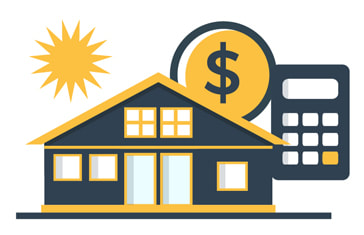Equity and LVR Calculator - The Definitive Guide for New Zealand Homeowners
Our guide explains how to calculate home equity and leverage, the significance of the Loan-to-Value Ratio (LVR), and the implications and insights of leveraging home equity.
Updated 10 September 2023
Summary:
Our guide explains what home equity and leverage is and walks through key examples of how you can calculate home equity and leverage ratios and the impact of having home equity or leverage that’s too high or too low. We also list frequently asked questions that New Zealanders have regarding home equity. We cover:
- There are many leading indicators that can help Kiwis to better understand their current or prospective property situations. Two of the most important concepts for homeowners is home equity and leverage.
- Home equity is a term that refers to the value of a homeowner's stake in a property. It's the difference between the property's market value and the amount of outstanding mortgage debt.
- Leverage, on the other hand, refers to the use of borrowed money to finance the purchase of an asset. When owning a house, understanding home equity and leverage is essential for making informed financial decisions, especially with the ongoing volatility in the property market.
Our guide explains what home equity and leverage is and walks through key examples of how you can calculate home equity and leverage ratios and the impact of having home equity or leverage that’s too high or too low. We also list frequently asked questions that New Zealanders have regarding home equity. We cover:
What is Home Equity? How is it Calculated?
Home equity is the value of a homeowner's interest in a property. It's calculated by subtracting the outstanding mortgage debt on the property from the property's market value. So to calculate home equity, you'll need to know the market value of the property and the amount of outstanding mortgage debt on the property. If you’re looking to compare and contrast current property market valuations for your home, our definitive guide to the best house price valuation websites has more details.
Home Equity Formula Example:
If a house has a market value of $500,000 and an outstanding mortgage debt of $300,000, the home equity would be calculated as follows:
Home Equity Formula Example:
If a house has a market value of $500,000 and an outstanding mortgage debt of $300,000, the home equity would be calculated as follows:
- Home equity = Property market value - Outstanding mortgage debt
- Home equity = $500,000 - $300,000 = $200,000
What’s a leverage ratio? How do you calculate it?
A leverage ratio is a financial metric that measures the amount of borrowed money used to finance an asset, in this case, a house. The leverage ratio is calculated by dividing the property market value by the initial deposit amount.
Property Leverage Ratio Example.
For example, if a property has a market value of $500,000 and an initial deposit amount of 20% ($100,000), the leverage ratio would be calculated as follows:
Property Leverage Ratio Example.
For example, if a property has a market value of $500,000 and an initial deposit amount of 20% ($100,000), the leverage ratio would be calculated as follows:
- Housing Leverage Ratio = Property Market Value ($) / Initial Deposit ($)
- Housing leverage Ratio = $500,000 / $100,000
- Housing Leverage ratio = 5X or 5 times leverage
What are Loan-to-Value Ratio (LVR) Restrictions? Who Sets Them and Why?
One of the other common leverage ratios mortgage lenders use is the Loan-to-Value Ratio (LVR). LVR restrictions limit the amount of borrowing a lender will allow based on the value of the purchased property. LVR restrictions are designed to reduce the risk of financial distress for borrowers and lenders and may be adjusted based on economic conditions and other factors.
The lender typically sets LVR restrictions, but they're also imposed by regulatory authorities such as the Reserve Bank of New Zealand (RBNZ) - you can see the latest LVR limits here (effective from 1 June 2023 onwards). Unlike the leverage ratio, the LVR framework has been developed and implemented by the RBNZ to limit the amount of "risky" or higher-risk lending that banks operating in New Zealand can undertake. The LVR is calculated by dividing the outstanding mortgage debt on the property by the property's market value.
LVR Example and Standard Calculation:
Over time, as you make mortgage payments and the value of the property increases, your home equity will also increase. For example, if the property's value increases to $550,000 after five years, your home equity would increase to $250,000 (the difference between the property's value and the outstanding mortgage debt).
The lender typically sets LVR restrictions, but they're also imposed by regulatory authorities such as the Reserve Bank of New Zealand (RBNZ) - you can see the latest LVR limits here (effective from 1 June 2023 onwards). Unlike the leverage ratio, the LVR framework has been developed and implemented by the RBNZ to limit the amount of "risky" or higher-risk lending that banks operating in New Zealand can undertake. The LVR is calculated by dividing the outstanding mortgage debt on the property by the property's market value.
LVR Example and Standard Calculation:
- Imagine you’re a homeowner who has recently purchased a property for $500,000. You put down a 40% down payment, which means you financed the remaining 60% through a mortgage. In this example, your outstanding mortgage debt would be $300,000 (60% of the property's value), and your home equity would be $200,000 (40% of the property's value).
- If your property has a market value of $500,000 and an outstanding mortgage debt balance of $300,000, the leverage ratio would be calculated as follows:
- Loan to Value Ratio (LVR) = Outstanding Mortgage Debt / Property Market Value
- Loan to Value Ratio (LVR) = $300,000 / $500,000
- Loan to Value Ratio (LVR) = 0.6 or 60%
Over time, as you make mortgage payments and the value of the property increases, your home equity will also increase. For example, if the property's value increases to $550,000 after five years, your home equity would increase to $250,000 (the difference between the property's value and the outstanding mortgage debt).
Why should I care about leverage ratios?
Understanding your leverage ratio can be important for several reasons:
- Clarity on real ownership: It can help you understand how much of the property's value is financed through borrowing. This clarity can be useful for making informed financial decisions, such as whether to pay off your mortgage faster or invest in other assets.
- Show how much exposure and risk you’re taking on: A high leverage ratio can increase your risk of financial distress if the value of the property declines. This situation occurs because a large portion of the property's value is financed through borrowing. As a result, a decline in the property's value can result in the property being worth less than the outstanding mortgage debt. This decline can lead to negative equity, where the property is worth less than the outstanding mortgage debt. Understanding your leverage ratio can help to show how much potential risk you’re taking on if the property market declines.
Frequently Asked Questions
What’s the typical leverage ratio for housing in New Zealand?
There’s no specific leverage ratio that’s considered "typical" for housing in New Zealand. Instead, the leverage ratio will vary depending on the individual circumstances of the homeowner and the property, such as the size of the mortgage, the down payment, and the property's market value. Generally, first-home buyers will have larger leverage ratios than other Kiwi homeowners, given that most Kiwis buying property for the first time have lower deposits (e.g. 10% to 20%) than those buying for investment reasons (30%+).
For example:
For example:
- If we assume a first home buyer puts down a 20% deposit, their leverage ratio will be five times leverage. However, typically only a small minority of homeowners will be first-home buyers.
- On the other hand, those that have held their property for decades and have consistently paid down their mortgage are likely to have far lower leverage ratios (with some that may have paid off their mortgage completely, meaning they don't have any leverage on their property).
- Overall, the "typical" leverage ratio for the average home in New Zealand may sit in the two to three times leverage range.
Can I use my home equity to borrow money?
Yes - you may be able to use your home equity to borrow money through a top-up loan or a reverse mortgage. These types of loans allow you to borrow against the equity in your home, which can be a useful source of funding for home renovations, debt consolidation, or other expenses. However, it's important to know that borrowing against your home equity comes with risks.
For more detail on reverse mortgages or borrowing against your home equity, please visit our guide to Reverse Mortgages and the New Zealand Government’s breakdown of borrowing against the value of your home (external website)
For more detail on reverse mortgages or borrowing against your home equity, please visit our guide to Reverse Mortgages and the New Zealand Government’s breakdown of borrowing against the value of your home (external website)
Can I lose my home if I have a high leverage ratio?
Yes, but this is only if you're unable to repay your mortgage - otherwise even if your home deceases in value and leads to negative equity (where the property is worth less than the outstanding mortgage debt), making ongoing mortgage repayments will be sufficient. Our guide to negative equity has more details.
Can I increase my home equity by making extra mortgage payments?
Yes, making extra mortgage payments can help you pay your mortgage faster and increase your home equity. Every time you make a mortgage, a portion of the payment goes towards paying off the principal (the amount you borrowed), and a portion goes towards paying the interest. By making extra payments, you can reduce the amount of principal you owe faster, increasing your home equity. Our Mortgage Overpayment Calculator shows how this works.
However, many mortgages have a limit as to how much you can overpay every year - you'll need to read the terms and conditions and contact your bank or mortgage broker if it's not clear.
However, many mortgages have a limit as to how much you can overpay every year - you'll need to read the terms and conditions and contact your bank or mortgage broker if it's not clear.
Can I use my home equity to invest in other assets?
Some Kiwis with more risk appetite may use their home equity to invest in other assets, such as shares or investment property. However, it's important to consider the risks and potential returns carefully before making this decision.
Using your home equity to invest in other assets can be risky, as it requires you to take on additional debt and could potentially lead to negative equity if the value of the assets you invest in declines. Therefore, it's important to carefully assess your financial situation and risk tolerance before making investment decisions. For more information, our guide to borrowing to invest in New Zealand explains the risks involved.
Using your home equity to invest in other assets can be risky, as it requires you to take on additional debt and could potentially lead to negative equity if the value of the assets you invest in declines. Therefore, it's important to carefully assess your financial situation and risk tolerance before making investment decisions. For more information, our guide to borrowing to invest in New Zealand explains the risks involved.
Can I refinance my mortgage to increase my home equity?
Refinancing your mortgage can potentially increase your home equity if you can secure a lower interest rate on your new mortgage. When you refinance your mortgage, you may be able to lower your monthly payments and pay off your mortgage faster.
This accelerated paydown can increase your home equity by reducing the principal you owe on the mortgage. However, refinancing your mortgage also involves closing costs and other fees, so it's important to consider the costs and benefits before deciding.
This accelerated paydown can increase your home equity by reducing the principal you owe on the mortgage. However, refinancing your mortgage also involves closing costs and other fees, so it's important to consider the costs and benefits before deciding.
Can I sell my home to get cash out of my home equity?
Yes, you can sell your home to access the equity you have built up in the property. When you sell your home, you can use the proceeds from the sale to pay off your mortgage and any other debts, and any remaining funds would be considered your home equity. However, it's important to consider the costs of selling a home, such as real estate agent fees, when deciding whether to sell your home to access your equity.
What’s the difference between home equity and usable equity?
Home equity refers to the value of a homeowner's interest in a property, calculated as the difference between the property's market value and the outstanding mortgage debt. Usable equity refers to the amount of home equity that can be accessed for borrowing or other financial purposes. Usable equity may be limited by factors such as the lender's lending policies and the borrower's ability to make mortgage payments. Because of these limiting factors, the amount of usable equity in a property will generally be lower than that of home equity.
How can I create more usable equity?
There are several ways to create more usable equity in your home:
- First, pay off your mortgage faster: Making extra mortgage payments can help you pay off your mortgage faster and increase your home equity.
- Then, increase the value of your property: Improving the condition of your property or making renovations can increase the property's value, which can increase your home equity.
- Lastly, wait for the property's value to increase: If the property's value increases over time, your home equity will also increase.
What amount of equity do you need to put in at a minimum?
The amount of equity you need when purchasing a home will depend on the lender's policies and the type of mortgage you are applying for. For example, some lenders may require a minimum down payment of 20% of the property's value. In contrast, others may allow you to put down less. For example, Government-backed Kainga Ora has a scheme that allows first-home buyers to put down a 5% deposit (when purchasing eligible homes). However, most banks in New Zealand generally require you to have at least 10% - 20% deposits when purchasing owner-occupied homes. Therefore, it's important to carefully discuss, research and compare different mortgage options to find a lender and mortgage product that meets your needs and financial situation.
What happens to home equity as prices drop?
If the prices of homes drop, the value of your home may also decline, which can decrease your home equity. For example, if the value of your home drops from $900,000 to $750,000 and you have an outstanding mortgage debt of $600,000, your home equity would decrease from $300,000 to $150,000. Therefore, it's important to carefully monitor the value of your home and consider the risks of negative equity if you are concerned about declining home prices.
What happens if house prices drop? Will my equity get wiped out?
If the value of your home drops and you have a high leverage ratio (a high proportion of the property's value financed through borrowing), you may lose some or all of your equity. This scenario can occur if the property's value declines significantly and you cannot make mortgage payments, leading to negative equity where the property is worth less than the outstanding mortgage debt.
It's important to carefully manage your leverage ratio and make sure you can afford your mortgage payments even if the value of the property declines.
It's important to carefully manage your leverage ratio and make sure you can afford your mortgage payments even if the value of the property declines.
What’s the property market likely to do in the next few years?
It's difficult to predict exactly what the property market will do in the next few years, as various factors such as economic conditions, population growth, and government policies can influence it. However, understanding how much home equity you have and how levered you are is essential to weathering any potential market downturn.
Will negative equity impact my ability to refinance my mortgage?
If you have negative equity in your home (meaning the property is worth less than the outstanding mortgage debt), it may be more difficult to refinance your mortgage. Lenders may be hesitant to lend to borrowers with negative equity, as it increases the risk of default. If you're unable to refinance your mortgage, you'll need to consider other options, such as negotiating with your existing lender or selling the property (even if that's at a loss).




